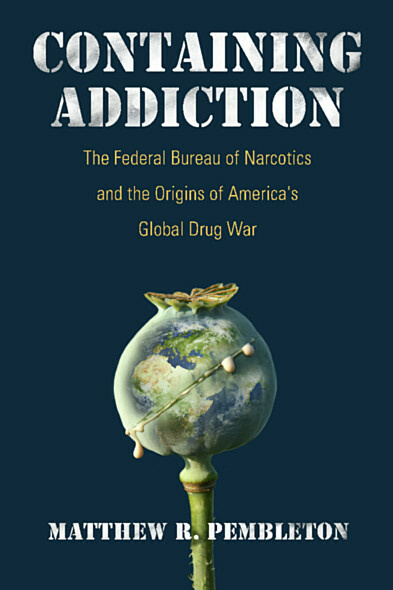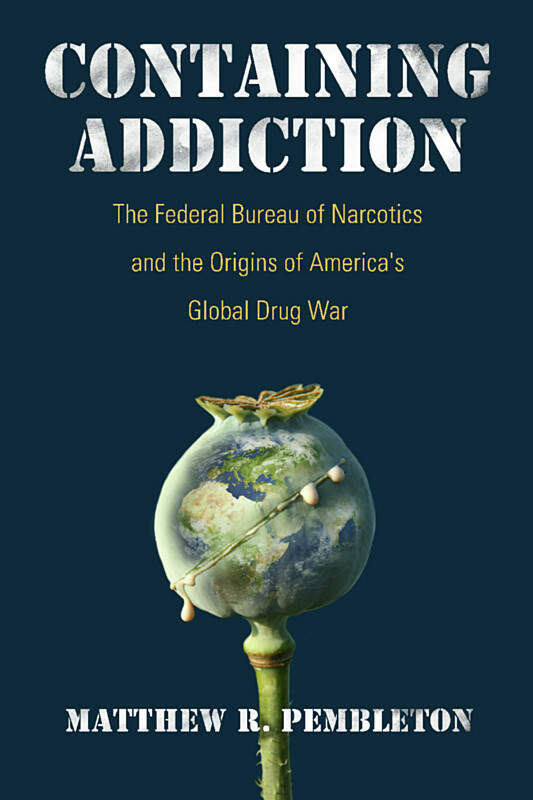Containing Addiction
The Federal Bureau of Narcotics and the Origins of America's Global Drug War
University of Massachusetts Press
The story of America's "War on Drugs" usually begins with Richard Nixon or Ronald Reagan. In Containing Addiction, Matthew R. Pembleton argues that its origins instead lie in the years following World War II, when the Federal Bureau of Narcotics—the country's first drug control agency, established in 1930—began to depict drug control as a paramilitary conflict and
sent agents abroad to disrupt the flow of drugs to American shores.
U.S. policymakers had long viewed addiction and organized crime as profound domestic and trans-national threats. Yet World War II presented new opportunities to implement drug control on a global scale. Skeptical of public health efforts to address demand, the Federal Bureau of Narcotics believed that reducing the global supply of drugs was the only way to contain the spread of addiction. In effect, America applied a foreign policy solution to a domestic social crisis, demonstrating how consistently policymakers have assumed that security at home can only be achieved through hegemony abroad. The result is a drug war that persists into the present day.
sent agents abroad to disrupt the flow of drugs to American shores.
U.S. policymakers had long viewed addiction and organized crime as profound domestic and trans-national threats. Yet World War II presented new opportunities to implement drug control on a global scale. Skeptical of public health efforts to address demand, the Federal Bureau of Narcotics believed that reducing the global supply of drugs was the only way to contain the spread of addiction. In effect, America applied a foreign policy solution to a domestic social crisis, demonstrating how consistently policymakers have assumed that security at home can only be achieved through hegemony abroad. The result is a drug war that persists into the present day.
Containing Addiction is a pioneering history of U.S. drug control policy and the Federal Bureau of Narcotics that is well written and replete with great detail.'—Jeremy Kuzmarov, author of The Myth of the Addicted Army: Vietnam and the Modern War on Drugs
'Matthew R. Pembleton elucidates this productive failure of America's global drug war through a cultural and institutional history of the Federal Bureau of Narcotics (FBN), modern precursor to the Drug Enforcement Agency (DEA) . . . Containing Addiction is thus essential reading for historians concerned with drug policy, state formation, policing, and mass incarceration.'—Journal of American History
'Matthew R. Pembleton's new book is a welcome addition to the 'new drug history' that draws on interdisciplinary research to understand how our perspective on and response to narcotics have evolved over the past century, and how the global drug war is about much, much more than drugs.'—Diplomatic History
'Matthew R. Pembleton uses narrative, fresh biography, and deep research to nail two important truths. What we call the drug war is really a series of wars stretching back nearly a century. And those wars, like the Cold War with which they overlapped, served many ends, national security interests and partisan politics chief among them. What they did not serve, Pembleton shows, was the goal of keeping Americans free from addiction, a plague worse at the end of a century of drug warring than at the beginning.'—David Courtwright, author of Dark Paradise and Forces of Habit
'Containing Addiction reads like a true crime page turner, yet delivers a straight-from-the-archives, lucidly argued history of the narcotics agents who built America's global drug war.'—David Herzberg, author of Happy Pills in America: From Miltown to Prozac
'Containing Addiction is the first truly comprehensive and sophisticated history of Harry J. Anslinger's Federal Bureau of Narcotics—the often vilified early anti-drug agency that set the terms of America's long and failed 'War on Drugs.' The book elevates what I have termed the New Drug History to a new level by bringing illicit drugs fully into study of American state power and its foreign relations. Moreover, Pembleton is a lucid, smart, and engaging writer, who will be read by scholars and general audiences alike. This is one of the essential books in American drug history.'—Paul Gootenberg, author of Andean Cocaine: The Making of a Global Drug
'A path-breaking scholarly history told as a thriller, this important book unmasks the intersection of the Federal Bureau of Narcotics with the spread of American empire. Surveillance of private citizens combined with a paranoid vision of continuous American vulnerability to foreign threats to prompt the emergence of a national security state that violated civil liberties and intervened in the affairs of foreign countries. As the war on drugs claims ever more victims at home and abroad, Containing Addiction is essential reading for policy-makers and scholars alike.'—Max Paul Friedman, author of Rethinking Anti-Americanism: The History of an Exceptional Concept in American Foreign Relations
'Containing Addiction provides important historical context about the origins of late twentieth and early twenty-first century US drug-control policy. This book should be of much interest to scholars and historians looking to understand the choices behind the long-term development of the war on drugs and the artificial division of drugs into categories like licit and illicit.'—Pharmacy in History
Matthew R. Pembleton is a writer and historian based in the Washington, DC region. He teaches at American University.






